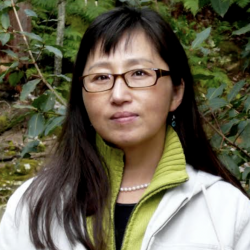The dead without faces
run out like patients
when the door of the intensive care unit opens
carrying pouches of heart, pouches of urine
The dead running toward the path to the underworld
turn into stone pillars when they look back and their eyes meet
their past
The dead in their sacks look out with eyes brimming with salt
water
The dead become pillars of water as their tears melt their bones
The dead, gone forever, departed before you,
pull amniotic sacs over their heads and get in line to be born
again
and say that they need to learn their mother tongue all over
again
You’re not there when they awake or even when they eat
breakfast
When the dead swarm down the mountain
like children who pour out of the door of the first-grade room
carrying their notebooks and shoe bags
a four-ton bronze bell with a thousand names of the dead
engraved on it dangles from the helicopter
The helicopter flies over a tall mountain to hang the bell at a
temple hidden deep in the mountains
Notes on the Poem
This week’s poem launches our Poem of the Week’s new focus on the poet-translator. Over the next few months, we will be featuring material (interviews, poems, essays) exploring the complex relationship between poetry and translation. The Griffin Poetry Prize is one of the very few international prizes that accepts works in translation (under the condition that the work be translated to English). By featuring poems in translation, we wish to highlight creative affinities between our shortlisted poets, as well as translation as an act of creative collaboration. We begin the week with “Underworld,” from the 2019 winning collection, Autobiography of Death (2019), translated by Don Mee Choi and written by Kim Hyesoon. “In the grievous wake of the Sewol Ferry incident of 2014, the Korean poet Kim Hyesoon composed a cycle of forty-nine poems – one for each day the dead must await reincarnation – to produce a harrowing work of shock, outrage, and veneration for the children lost to this disaster. Through Don Mee Choi’s extraordinary translations, we hear the clamorous registers of Kim’s art – a transnational collision of shamanism, Modernism, and feminism – yield ‘a low note no one has ever sung before.’ That otherworldly tone may sound like life itself, the poet sings, ‘for even death can’t enter this deep inside me,'" the judges said. Listen to Don Mee Choi and Kim Hyesoon read poems from Autobiography of Death here.
